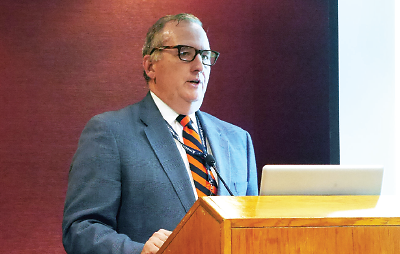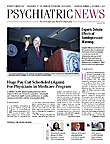Attendees at APA’s Institute on Psychiatric Services in San Francisco were provided with an in-depth overview of the history, symptomatology, and recent outbreak of the Ebola virus, as well as information on how psychiatrists can play a role during this period of intense concern about the epidemic’s spread.
“Fever is the predominate symptom seen with a person infected with Ebola,” said George Rutherford, M.D., head of the Division of Infectious Disease Epidemiology at the University of California, San Francisco. Symptoms associated with Ebola appear in various phases beginning with fever, followed by abdominal-related symptoms, such as vomiting and diarrhea, and “then it can progress to more severe symptoms such as meningitis- and cephalitis-like symptoms and [finally] to uncontrolled bleeding,” he said. “Symptoms usually appear between 20 and 21 days” after infection.
As of October 27, he noted, there were 13,703 cases of Ebola reported worldwide. Liberia and Sierra Leone are the most heavily affected, and the disease has also claimed victims in neighboring Guinea.
At that time, the United States had nine reported Ebola cases. Rutherford noted that amid hysteria breaking out in the United States concerning Ebola, there is a very small chance that Americans who have not been to West Africa or taken care of patients with the Ebola virus will contract it.
“What is important is the epidemic in West Africa, where we need to concentrate our resources,” stressed Rutherford. “Being prepared in the U.S. is prudent and appropriate, but what is more appropriate is to be concerned about West Africa. ... If we don’t stop the epidemic in West Africa, it will definitely spread.”
During an interview with Psychiatric News, Rutherford said that the Centers for Disease Control and Prevention has put 300 medical professionals on the front lines in West Africa to help rein in the spread of Ebola, while the Department of Defense plans to train 500 health care workers to care for patients infected with Ebola. He empathized that psychiatrists are needed as well, to deal with mental health consequences associated the virus—such as posttraumatic stress disorder, stigma, and issues associated with bereavement—which many patients and families in West Africa are now dealing with. He emphasized, however, that the mental health consequences associated with Ebola are not restricted to the hardest-hit areas.
“There is also this exaggerated stigma and hyperanxiety about casual exposure [to Ebola] in the U.S, … particularly in hospitals,” Rutherford noted. He advised psychiatrists to reach out to their local hospitals to become part of Ebola preparation teams—which are being formed in hospitals throughout the nation—to provide an adequate mental health resource for hospital workers who treat Ebola patients. “Mental health workers are definitely needed,” he emphasized. ■

